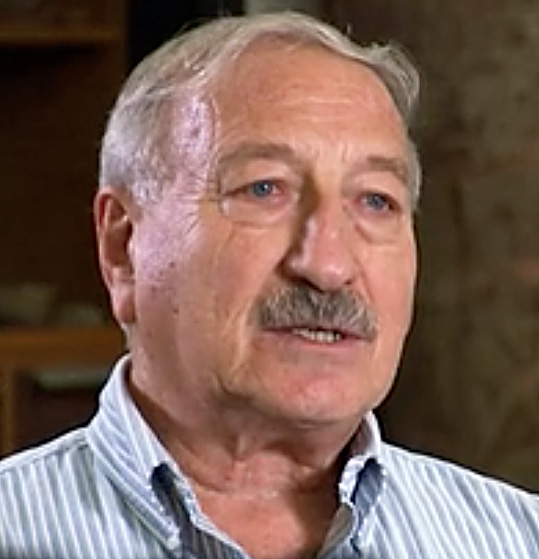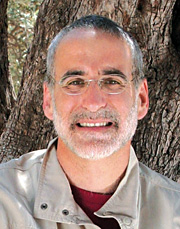Fighting for the Promised Land
We examine the battle at Hazor, where Joshua secured the northern territories for Abraham’s offspring.
Air dates: 2021-Aug-11
Production Code: 2124
Episode 5 of 8 in the series “Eretz Israel (The Land of Israel) (2021)”
Duration: 28:30
Year: 2021
![Closed Captioned [CC]](/pics/cc.png) Closed Captioned
Closed Captioned
Other ways to watch:

Transcript
Caption transcript for Eretz Israel (The Land of Israel) (2021): “Fighting for the Promised Land” (5/8)
- 00:03 male announcer: Welcome to “Our Jewish Roots,” with
- 00:06 insightful Bible teaching from Israel by Dr. Jeffrey Seif.
- 00:09 We traveled to Hazor today on “Eretz Israel:
- 00:13 The Land of Israel.”
- 00:17 ♪♪♪
- 00:25 announcer: Look to the north, the south, the east, the west.
- 00:35 ♪♪♪
- 00:41 announcer: All the land which thou seeth, to thee will I give
- 00:45 it and to thy seed forever.
- 00:50 Indeed, he who watches over Israel
- 00:53 will neither slumber nor sleep.
- 00:56 ♪♪♪
- 01:03 announcer: Eretz Israel.
- 01:05 ♪♪♪
- 01:12 David Hart: We are so glad you’ve joined
- 01:13 us today, I am David Hart.
- 01:14 Kirsten Hart: I’m Kirsten Hart.
- 01:16 Dr. Jeffrey Seif: And I am Jeffrey Seif.
- 01:18 And we are going back to one of my favorite places in Israel,
- 01:23 the north, a place called Hazor.
- 01:25 I love filming here.
- 01:27 Kirsten: You know what, we see it from the right side
- 01:29 of the bus as we’re driving up north, and it’s like, “That’s–“
- 01:32 And we get a little history lesson of it on tour,
- 01:34 but we’ve never been.
- 01:36 And you have. Ooh.
- 01:38 Dr. Seif: Maybe it’s not much to look at from a bus, you know?
- 01:40 People have to be selective on where they stop to get in all
- 01:44 the major Bible sites.
- 01:45 This is an important site because it so
- 01:47 corroborates the biblical text.
- 01:50 The Bible speaks of a great conflagration there,
- 01:53 a great battle, a great fire at a certain point in time,
- 01:56 and you can go and look at the ruin and see the burn marks.
- 02:00 And the carbon dating goes back to that very time.
- 02:04 It gives a credibility to biblical literature that
- 02:07 wouldn’t otherwise be there.
- 02:09 Kirsten: They’ve always been fighting–
- 02:11 we talk about this too–
- 02:12 always been fighting for that land.
- 02:14 Here’s a question. Please don’t write in to me.
- 02:17 I’m just–I don’t wanna say someone else’s advocate,
- 02:20 but here’s a question.
- 02:21 Shouldn’t they just be content?
- 02:23 Shouldn’t Israel right now just be content
- 02:24 with the land that they have?
- 02:26 Dr. Seif: Well, I think contentment is a recipe
- 02:30 for disaster in life.
- 02:31 I don’t think I should be content
- 02:33 with the physical body that I have.
- 02:35 I need to work at keeping it healthy,
- 02:37 and Israel certainly needs to work at keeping her borders
- 02:40 secure and established.
- 02:43 I don’t wanna be lazy with it.
- 02:44 It’s the beginning of undoing, in my opinion.
- 02:48 David: Dr. Seif will be teaching on Joshua chapter 11,
- 02:51 but right now let’s step back in time to that ancient city.
- 02:57 announcer: “And Joshua took Hazor, and smote the king
- 03:00 thereof with the sword: for Hazor beforetime
- 03:04 was the head of all those kingdoms.
- 03:07 And they smote all the souls that were therein with the
- 03:10 sword, utterly destroying them: and he burnt Hazor with fire.
- 03:17 So Joshua took the whole land, according to all that the Lord
- 03:21 said unto Moses; and Joshua gave it for an inheritance unto
- 03:25 Israel according to their divisions by their tribes.
- 03:29 And the land rested from war.”
- 03:38 Dr. Seif: I can almost hear the sound of trampling boots,
- 03:41 sword against sword as a great conflagration took place in
- 03:45 northern Israel, a place that we’re etching our way towards
- 03:49 step by step by step.
- 03:51 Come with me now.
- 03:53 We’re looking at yesterday.
- 03:55 Let’s visit it today.
- 03:56 The battle of Hazor.
- 04:03 ♪♪♪
- 04:13 ♪♪♪
- 04:23 ♪♪♪
- 04:33 ♪♪♪
- 04:43 ♪♪♪
- 04:45 Dr. Seif: It took a long time for them to get here.
- 04:49 On the way, there were various battles
- 04:52 with Transjordanian kings.
- 04:55 There was the famous battle of Jericho.
- 04:59 There was the necessity of defeating the coalition of
- 05:02 southern Canaanite peoples, and then it was time to take the
- 05:06 battle to the north as God’s people were securing
- 05:11 their place in God’s land.
- 05:14 Let me show you on this map.
- 05:17 So, we’re looking at a picture here of the
- 05:19 world in Joshua’s day.
- 05:21 We have the Great Sea, so called, the Mediterranean.
- 05:24 The Jordan River,
- 05:25 Bible readers are familiar with this, and
- 05:27 of course, the peaceful Sea of Galilee.
- 05:30 What we’re not so familiar with is the northern campaign,
- 05:33 a place that was not so peaceful,
- 05:35 a place called Hazor, right here,
- 05:39 and we’re gonna visit that very place.
- 05:42 ♪♪♪
- 05:52 ♪♪♪
- 05:58 ♪♪♪
- 06:07 Dr. Seif: The southern campaign had gone remarkably
- 06:10 well, much to the chagrin of the locals.
- 06:14 So, you might recall sometime prior, the Israelites were in
- 06:17 dread fear because the locals were so tall and they felt like
- 06:20 grasshoppers, but here the fortunes of war has shifted.
- 06:24 The southern federation of Canaanite peoples had been
- 06:28 decimated, and word gets up north,
- 06:32 and there’s trouble in river city.
- 06:34 There’s a King Jabin–it’s a dynastic name–and he will
- 06:38 mobilize a federation of northern Canaanite peoples,
- 06:43 to use that term broadly, and there will be a battle royal.
- 06:49 Before I show you from the Scripture,
- 06:51 let me pull out a map.
- 06:53 It’s not your modern garden variety map,
- 06:56 but something that might have been used–akin to what had been
- 07:00 used by the locals when they fought here many,
- 07:04 many, many years ago.
- 07:07 And just to show, if you will, this is the Mediterranean.
- 07:11 The Romans called it Mare Nostrum.
- 07:13 I know that I’m getting ahead, called Our Sea.
- 07:17 And the reason why I mentioned it is that Jabin here at Hazor
- 07:21 was so famous that ancient documents in form of political
- 07:25 alliances that he had with the states out into the
- 07:29 sea–Phoenicians, the Cretans in Cyprus.
- 07:34 And he was well connected politically,
- 07:36 as I’d noted earlier, with all the peoples round about,
- 07:40 and he is going to mobilize his energies to hold at bay these
- 07:45 encroaching Israelites that are there with a sense of a divine
- 07:49 mandate that God has spoken to Moses and directed them onward,
- 07:55 and Joshua is going onward.
- 07:58 We’re going to hear from Amnon Ben-Tor, professor at Hebrew
- 08:03 University, who’s going to talk a little bit about Hazor,
- 08:07 and then I wanna talk a little about the tribal area
- 08:10 round about, and then open up the Bible to consider the story.
- 08:15 Dr. Amnon Ben-Tor: We have a huge destruction
- 08:17 of the Canaanite city.
- 08:18 Wherever we dig, whether it is on the Acropolis,
- 08:22 whether it is in the lower city, the Canaanite period ends
- 08:26 with a huge destruction.
- 08:28 Sometimes more than a meter of debris–ashes,
- 08:33 wood, bricks, fallen bricks, mutilated statues,
- 08:38 and the like–which indicate, first of all,
- 08:41 that the disaster was human-made.
- 08:43 It’s no earthquake, because no earthquake would mutilate the
- 08:46 statues in a systematic way, so it was manmade.
- 08:50 And by now we can narrow it down to about the middle
- 08:55 of the 13th century B.C.
- 08:58 If we’re talking about biblical sites,
- 09:00 Hazor is the number one site.
- 09:02 There is no other which can even get close,
- 09:05 because if you’re talking just about the period
- 09:08 which we have, you want the Canaanites?
- 09:09 You have them.
- 09:11 You want the destruction of Joshua?
- 09:12 You have.
- 09:14 You want judges? You have.
- 09:15 You want Solomon? You have.
- 09:17 You want Jeroboam? You have.
- 09:19 You want Ahab? You have.
- 09:21 You want Pekah? You have.
- 09:22 You can show.
- 09:24 You can have the debate at Hazor.
- 09:27 You can show, “This is the gate which according to the Bible was
- 09:29 built by Solomon, in the time of Solomon.”
- 09:32 Now, you tell me it was not.
- 09:33 Let’s argue about it. You see what I mean?
- 09:35 But that there’s no other site which has that many strata which
- 09:41 are somehow related to the biblical narrative.
- 09:45 Dr. Seif: I have here Hazor in a bolder,
- 09:50 darker print and round about in a lighter print a notation of
- 09:54 the tribes who, after the conquest of the south and the
- 09:59 north and some other ancillary battles, eventually are going to
- 10:03 go to their inheritance.
- 10:05 And I wanna note that there was an inheritance that was given to
- 10:08 the people of Israel in this land,
- 10:10 an inheritance that was yesterday,
- 10:12 today, and continues on into tomorrow.
- 10:16 While speaking of yesterday, today,
- 10:18 and tomorrow, let’s open up the eternal Word and consider
- 10:23 something of what’s noted therein.
- 10:25 And where else would I wanna go but to the book
- 10:28 of Joshua the 11th chapter.
- 10:31 It’s always nice to see how biblical archaeology
- 10:34 corroborates the biblical text.
- 10:37 We’re going to consider a great war that was fought here in
- 10:41 Hazor, and you can even see the burn marks.
- 10:45 The biblical testimony is very clear that there was esh,
- 10:49 Hebrew word for fire, and it’s noted in the bricks.
- 10:53 It’s noted in the mud even many years later.
- 10:57 These stones are crying out and saying,
- 11:01 “You can trust this literature.”
- 11:03 Well, what does the text say in
- 11:05 Joshua chapter 11, verse 1?
- 11:07 “It came to pass that Jabin king of Hazor heard these things–“
- 11:12 Jabin was a dynastic name that had gone on for centuries.
- 11:16 What things did he hear?
- 11:18 He heard about the Israelite conquest of the south,
- 11:22 and he was not a happy camper.
- 11:26 We read on in the literature, he mobilizes peoples round about,
- 11:30 and there is a battle royal that is fought here.
- 11:35 We’re told in verse 10, however, difficulties notwithstanding,
- 11:39 that Joshua, he was successful in his endeavors,
- 11:44 and that Hazor was struck, and the king was struck with the
- 11:48 edge of the sword, an expression that denotes victory.
- 11:53 We’re told in verse 12, “All the cities of the kings,
- 11:57 and all their kings, Joshua took and struck–“
- 12:02 Again, a battle royal, a battle that went to the Hebrews.
- 12:07 I want you to look with me, please.
- 12:09 We’re told in verse 18 that war went for a long time.
- 12:13 Not every trial in life goes away just like that.
- 12:15 Sometimes you have to walk it out,
- 12:17 but there’s a positive end result.
- 12:19 Go with me, please, to verse 23.
- 12:21 We’re told that “Joshua took the whole land according–“
- 12:26 Now, this is important to me. It’s not just a war.
- 12:29 We’re told that it’s according to all that the
- 12:31 Lord had said to Moses.
- 12:34 There’s divine promise in this.
- 12:37 This is called the Promised Land because from on high it’s
- 12:40 commended, a certain place is commended to a certain people.
- 12:44 We’re told because the Lord said to Moses, and Joshua gave it
- 12:48 as an inheritance to Israel according to their divisions.
- 12:55 What do we note from the biblical text?
- 12:58 We note that there was a battle, a battle royal that raged,
- 13:02 and we know that it went to Israel.
- 13:04 And it wasn’t just the good fortunes of war,
- 13:06 but rather it’s God himself leading a particular people to a
- 13:10 particular place to accomplish his particular purposes.
- 13:14 ♪♪♪
- 13:24 ♪♪♪
- 13:30 announcer: Our offer on this program, a DVD collection
- 13:33 of all eight programs in our series “Eretz Israel.”
- 13:37 Take a backroads journey with Dr. Jeffrey Seif
- 13:40 through the Holy Land.
- 13:41 Explore the Bible’s account of Israel’s past,
- 13:44 present, and future.
- 13:45 Journalist David Dolan joins Dr. Seif and lends his insight
- 13:49 regarding the modern-day struggles that accompany the
- 13:52 reestablishment of the ancestral Jewish homeland.
- 13:56 This is a series that sets the record straight,
- 13:58 the biblical and historical account of the land of Israel.
- 14:03 Call 1-800-WONDERS and ask for “Eretz Israel.”
- 14:10 announcer: Join us right now for additional content that is
- 14:13 only available on our social media sites: Facebook,
- 14:16 YouTube, and Twitter.
- 14:18 Visit our website, levitt.com, for the current and past
- 14:21 programs, the television schedule, tour information, and
- 14:25 our free monthly newsletter which is full of insightful
- 14:28 articles and news commentary.
- 14:30 View it online, or we can ship it directly
- 14:32 to your mailbox every month.
- 14:35 Also on our website is the online store.
- 14:38 There, you can order this week’s resource,
- 14:40 or you can always give us a call at 1-800-WONDERS.
- 14:45 Your donations to Our Jewish Roots help us to support these
- 14:48 organizations as they bless Israel.
- 14:51 Please remember we depend on tax-deductible
- 14:53 donations from viewers like you.
- 14:57 announcer: For many, a trip to the Holy Land is
- 14:59 the dream of a lifetime.
- 15:03 The Bible truly comes alive as you see the sites where
- 15:06 so many biblical events happened.
- 15:09 Come on a Zola tour to see Israel and Petra.
- 15:15 See the land of the Bible for yourself.
- 15:19 Contact us to reserve your dream of a lifetime.
- 15:27 David: Many of the sites you see in the series,
- 15:30 we take you there on our tour, both in the fall and the spring.
- 15:33 Some great places, one that we’re talking about today.
- 15:36 Kirsten: Right, at the beginning of our program, Jeff was at
- 15:39 Hazor, the ancient city, and we pass by that.
- 15:43 Here’s the thing: not every tour that goes to the Holy Land
- 15:46 goes to northern Israel.
- 15:48 Lots of times they’ll stop at Sea of Galilee,
- 15:50 and then go down to Jerusalem.
- 15:51 We take you way up north, and the Jordan River valley
- 15:56 is gorgeous and lush.
- 15:58 We would love for you to go with us.
- 15:59 Dr. Seif: Yes, and we like to take you to places where you
- 16:03 normally wouldn’t go, even on a trip to Israel.
- 16:06 Much as in this program, we like to take you to places
- 16:09 intellectually, emotionally, spiritually,
- 16:11 and visually which you wouldn’t otherwise go to,
- 16:15 and we hope you find it enriching,
- 16:17 that it contributes to your walk with the Lord and your
- 16:19 understanding of biblical history.
- 16:21 If you do find value in it, I wanna ask you please sow some
- 16:25 resource in it to help us to do it.
- 16:28 It doesn’t come cheap. We don’t ask often.
- 16:30 If there’s a need, I put it forth in front of you,
- 16:33 and I’m not ashamed to do so ’cause it’s a worthy cause.
- 16:36 If you think it’s worth it, sow into it today.
- 16:39 David: The Burma Road is an important road.
- 16:41 David Dolan takes us there right now.
- 16:45 Dr. Seif: This is a model of the Burma Road,
- 16:48 a strategic road for survival constructed by Israeli Forces
- 16:51 during the War of Independence.
- 16:54 David Dolan joins us now to tell us more about that road and the
- 16:58 miraculous story against encroaching Arab forces.
- 17:04 David Dolan: The day after the UN Partition Plan was
- 17:06 approved in New York, the fighting over this land began.
- 17:10 Irregular Arab Forces from Iraq, from Syria,
- 17:14 from Jordan, from Lebanon, and from Egypt crossed over.
- 17:17 Others came from Libya and farther away to help the local
- 17:21 Arabs, the Fedayeen, in the battle against the Jews.
- 17:24 The British were still here, but they mostly stood on the
- 17:27 sidelines and let the Jews fight for themselves.
- 17:29 But they hadn’t allowed the Jewish community here
- 17:32 to bring in heavy weapons.
- 17:34 They had no aircraft. They had no actual tanks.
- 17:37 They just had the arms they were manufacturing themselves,
- 17:40 light arms, for the most part.
- 17:42 The Arabs were convinced that they would swiftly defeat the
- 17:45 Jews and there would be no Jewish state when the British
- 17:48 left in the middle of May.
- 17:50 The fighting became fierce in February and March.
- 17:53 Tiberias was captured on April 19, Haifa on April 23.
- 17:58 The fighting spread down to the Tel Aviv area.
- 18:00 Jaffa was captured by the Jewish forces on May 12.
- 18:05 Meanwhile, Palestinians, Arabs started to flee their
- 18:08 homes in greater numbers.
- 18:09 Some 20,000 had fled by May 15.
- 18:13 They were convinced they would soon come back to their homes
- 18:16 after the war was easily won by the Arab powers around them.
- 18:20 The road to Jerusalem, the main road connecting Tel Aviv and the
- 18:23 coastal areas to the Jewish community in western Jerusalem,
- 18:26 was cut off in the fierce battles.
- 18:28 It was then reopened, but after the declaration of independence
- 18:32 on May 15, the Jordanian army, the Jordanian Arab League
- 18:36 Forces, joined the battle.
- 18:38 They were very well trained by the British.
- 18:40 They circumvented Jerusalem and came down the hill
- 18:43 to the Latrun Junction.
- 18:45 Fierce battles took place there, and they defeated the Jewish
- 18:48 forces, and again the road was completely closed.
- 18:52 No supplies were getting up to the
- 18:53 Jewish community in Jerusalem.
- 18:55 Food was short, water was running out,
- 18:57 medicines were running out, so the Jews opened an alternative
- 19:01 route, and we’re standing at the site where that began.
- 19:04 It was dubbed the Burma Road after the great road that was
- 19:07 opened during World War II by the Allies connecting Burma to
- 19:10 China, and it succeeded in bringing supplies around the
- 19:14 main road up into Jerusalem.
- 19:16 And you can see part of the road behind me here.
- 19:19 The battles were fierce, and by the middle of June, the Arabs
- 19:23 had tired of the battle.
- 19:24 They were not fighting very well anymore.
- 19:27 The Jews were continuing to fight back with strength.
- 19:29 Historians say it’s because the Jews
- 19:32 were fighting for their lives.
- 19:33 They knew their country was going to be destroyed
- 19:36 if they lost this war.
- 19:38 Many of them were Holocaust survivors that literally got off
- 19:41 of the boats from Europe and were given a gun and told
- 19:43 to go to the warfront.
- 19:45 Their motivation was extremely high.
- 19:47 A truce was declared on June 10.
- 19:49 During this period of fighting, another 200,000 to 300,000
- 19:53 Palestinians had fled their homes.
- 19:56 Most of them didn’t go to other countries, though.
- 19:58 They went to the areas that the partition plan designated
- 20:00 for a Jewish state.
- 20:02 They went to family homes in Judea and Samaria.
- 20:05 They went to homes in the Gaza Strip and other areas,
- 20:08 but about a third went to Jordan and to Lebanon
- 20:11 and to Syria and other places.
- 20:13 Fighting resumed on July 8 and lasted till July 18.
- 20:17 Another 20,000 to 30,000 Arabs fled their homes during this
- 20:20 time, and this was the only time that the Israeli Forces
- 20:24 deliberately evacuated some of the Arabs from their homes.
- 20:28 That was in two towns, Ramle and Lydda,
- 20:30 right next to the vital Ben Gurion Airport,
- 20:33 the only airport in the country at that time.
- 20:37 There was another ceasefire, as I said,
- 20:39 in July, and that lasted until mid-October when fighting began
- 20:44 again, and during this time, this third period of fighting,
- 20:47 the Jews succeeded in reopening the road from Tel Aviv to
- 20:51 Jerusalem, and this Burma bypass was no longer so essential.
- 20:56 More Palestinians fled their homes during this time.
- 20:59 The UN said that the total Palestinian refugee
- 21:02 flight was 726,000.
- 21:05 The Israelis said it was more like 600,000 since,
- 21:09 as I said, many had gone back to family homes,
- 21:11 hadn’t really become refugees at all.
- 21:13 The Arabs put the number at over a million.
- 21:17 Six thousand three hundred and seventy-two Jews lost their
- 21:20 lives during this war, by far the greatest death toll in any
- 21:23 of Israel’s wars, one percent of the population.
- 21:26 Two thousand four hundred of those were civilians.
- 21:29 ♪♪♪
- 21:39 ♪♪♪
- 21:42 Dr. Seif: David, it’s like things never change.
- 21:45 Jews were always fighting for a right to be in this real estate.
- 21:48 David: Absolutely, and you know, we’ve just been talking about
- 21:51 the ancient battles here in the land and the modern battles.
- 21:54 I’m looking out at the Golan Heights here from Hazor,
- 21:57 and that has figured in what, two, three wars so far?
- 22:01 Maybe another one in the future.
- 22:03 Maybe another few in the future.
- 22:05 It hasn’t changed.
- 22:07 The Arab world, the Muslim world wants to see Israel destroyed,
- 22:11 so many of them, they keep saying it.
- 22:13 They’ve tried several times and failed,
- 22:15 going back to the time of Joshua,
- 22:17 and looks like there’s gonna be more attempts.
- 22:19 Dr. Seif: I mean, I’m a Bible guy.
- 22:20 I’m a lot about the divine Word of yesterday,
- 22:22 but you’re here on the ground in Israel.
- 22:24 What do these wars look like? How did it unfold?
- 22:27 David: Well, I covered the Lebanon War, just 25 miles north
- 22:31 of here, inside of Lebanon, and I was there
- 22:34 for the build up to it, the rockets coming across the
- 22:36 border pretty much every day.
- 22:39 I saw the kids running to the shelter.
- 22:41 I saw what life is like when there’s not actually war
- 22:45 declared, but there’s not peace.
- 22:48 And that’s the part of the story that often doesn’t get told,
- 22:51 that the Israeli people have suffered these almost constant
- 22:54 attacks since–well, really since the 1920s.
- 22:58 Not even since ’48, but, of course,
- 23:00 ’48 being the war with the largest number of casualties.
- 23:03 But it’s dramatic. It’s tough to live like that.
- 23:06 Dr. Seif: People lose a sense of that.
- 23:07 We read the biblical texts.
- 23:09 There’s a lot of sweat and blood, energy, drama, pain,
- 23:12 passion, and pleasure too, to see God come through and
- 23:15 give good success yesterday and today.
- 23:18 David: And it doesn’t happen without pain and tears and blood
- 23:21 and the price that’s paid.
- 23:24 This country is good about remembering that, you know?
- 23:26 You go from Memorial Day for the fallen soldiers to
- 23:30 Independence Day within a second.
- 23:32 They’re back to back as holidays here and that
- 23:35 reminds everyone of the price.
- 23:36 Dr. Seif: Yes, it seems that the Bible beckons us to
- 23:38 remember, because these wars are noted in the text.
- 23:41 Why is it that Bible people forget,
- 23:43 forget the Jews, forget Israel?
- 23:44 Why?
- 23:46 David: That is a good question.
- 23:47 I think it’s something that you would probably
- 23:50 have a better answer for.
- 23:51 It’s a spiritual mystery, really.
- 23:53 Dr. Seif: It surely is; you know, Paul speaks of how Jewish
- 23:55 people God loved, can look at the biblical text and not see
- 23:58 Jesus, but my question is how can Christian people
- 24:00 look at the biblical text and not see Jews in Israel?
- 24:03 Go figure. Blindness.
- 24:04 David: I have a friend here, a Jewish believer.
- 24:06 He says, you know, that Paul said that a blindness would fall
- 24:10 upon the Jewish people in part until it’s revealed who their
- 24:13 Messiah is, but he says it seems to have fallen on the church in
- 24:17 terms of who Israel is and their covenant relationship with God.
- 24:21 And that’s a shame, and it’s led to a lot of persecution against
- 24:24 Jews and wars against Jews.
- 24:26 Even here in the land, the Crusaders killed
- 24:28 thousands of Jews.
- 24:29 Dr. Seif: Yes, and you know, through what we’re doing
- 24:31 together, may God bless our labors to dispel that darkness
- 24:35 and set a little light from the biblical text.
- 24:38 ♪♪♪
- 24:44 ♪♪♪
- 24:49 David: I think the whole theme for today’s program has
- 24:51 been about fighting for real estate in Israel past
- 24:56 and present, future.
- 24:57 Dr. Seif: Yes, well, I look at all of life as a
- 25:00 struggle, to tell you the truth.
- 25:01 You know, there’s a reason why Paul encourages believers to
- 25:04 fight the good fight of the faith.
- 25:06 And armed as I am with that attitude,
- 25:09 it makes me more robust in response to the troubles of the
- 25:11 day, but never mind my own personal orientation.
- 25:15 It is true.
- 25:16 You look at it, Jews are forever picked on.
- 25:19 Friends are few, foes are many,
- 25:21 and we have to, you know, fight and press on to get on with it.
- 25:25 Kirsten: It’s kind of interesting
- 25:27 because there’s the blessing of this gift of land,
- 25:30 but there’s been a great price since the day God said to
- 25:34 Abraham, “This will be yours and for your generations.”
- 25:36 It’s like it’s a constant battle.
- 25:38 Dr. Seif: Yes, and I think for believers too.
- 25:39 I’ve said that if God’s got a call on your life,
- 25:41 hell has an assignment against you.
- 25:43 It’s true with real estate, if there’s anything to be said for
- 25:46 spiritual warfare and an enemy of the soul,
- 25:49 an adversary to what God is all about and who he’s all about.
- 25:52 If all that’s at play in human experience,
- 25:55 behind the scenes, one should expect a struggle,
- 25:57 but helpfully, it’s good to know there are godly people that
- 26:02 step up into the gap to push the ball forward,
- 26:05 whether that’s for the fight of the modern nation state of
- 26:08 Israel, whether it’s for this Jewish-related ministry.
- 26:12 God bless our friends.
- 26:13 Kirsten: Here’s a quick question.
- 26:15 We’ve watched, you know, every one of your teachings that we
- 26:18 have on this program, and you roll out this map,
- 26:22 and it shows a–the ancient lines of Israel and what it
- 26:26 really was, much larger than it is today.
- 26:29 So, here’s a question that I honestly don’t know.
- 26:32 Prophetically, will Israel get that original outline of the
- 26:36 land of Canaan back before the end times?
- 26:40 Dr. Seif: Well, let me just say if you look at–if you put a
- 26:42 belt around Planet Earth, it’s 24,000 miles.
- 26:45 You can go east or west in Israel.
- 26:47 It’s 10 miles, maybe 50 miles at the widest.
- 26:50 There is more real estate that’s commended to the people of
- 26:53 Israel, but still, you know, there’s this rhetoric the Jews
- 26:56 are taking over the Middle East.
- 26:57 It’s less than 1% of all the Arab holdings in the area.
- 27:01 But there is more land that’s commended to the Hebrew people,
- 27:04 and we’ll have to see how God brings that about
- 27:06 in his own timetable.
- 27:08 Kirsten: All right, well, thank you for today’s
- 27:09 teaching and insight and wisdom.
- 27:11 David: Our program’s over again today, I can’t believe it.
- 27:13 We love to end our program with a song
- 27:15 from our founder, Zola Levitt.
- 27:17 Dr. Seif: And a word of prayer.
- 27:18 Please sha’alu shalom Yerushalayim.
- 27:22 Kirsten: Pray for the peace of Jerusalem.
- 27:24 ♪♪♪
- 27:30 ♪♪♪
- 27:36 ♪ Yeshua, return unto our Father. ♪
- 27:42 ♪ Yeshua, return to us alone. ♪
- 27:48 ♪ Yeshua, return unto Israel. ♪
- 27:55 ♪ Yeshua, return unto your own. ♪
- 28:01 ♪ Yeshua, return unto Israel. ♪
- 28:07 ♪ Yeshua, ♪
- 28:09 ♪ return unto ♪
- 28:12 ♪ your own. ♪♪
- 28:19 ♪♪♪







